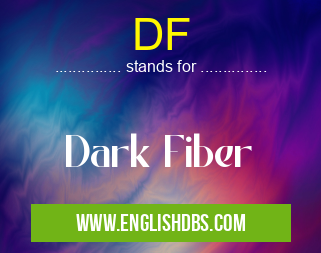What does DF mean in TELECOM
Dark Fiber (DF) refers to unused optical fiber cables that are not equipped with any active equipment, such as transmitters or receivers. These fibers are typically leased by telecommunication companies to businesses or organizations that require high-bandwidth and low-latency connections.

DF meaning in Telecom in Computing
DF mostly used in an acronym Telecom in Category Computing that means Dark Fiber
Shorthand: DF,
Full Form: Dark Fiber
For more information of "Dark Fiber", see the section below.
What is DF?
DF is a passive network infrastructure that consists of fiber optic cables. Unlike lit fiber, which is equipped with active equipment, DF does not have any electronics or amplifiers. This allows for greater flexibility and customization, as the user can choose the appropriate equipment based on their specific requirements.
Benefits of DF
- High bandwidth: DF provides extremely high bandwidth capabilities, typically ranging from 10 Gbps to 100 Gbps or even higher.
- Low latency: DF has very low latency, making it ideal for applications that require real-time data transmission.
- Scalability: DF is scalable, allowing users to increase bandwidth as needed by adding additional equipment.
- Cost-effective: Compared to lit fiber, DF can be a more cost-effective option for businesses that require high bandwidth and flexibility.
Applications of DF
DF is used in various applications, including:
- Data centers: Interconnecting data centers for high-speed data transfer and storage.
- Telecommunications: Providing high-capacity connectivity for voice, video, and data services.
- Cloud computing: Facilitating fast and reliable access to cloud-based applications and services.
- Enterprise networks: Connecting multiple locations or buildings within a single organization.
Essential Questions and Answers on Dark Fiber in "COMPUTING»TELECOM"
What is Dark Fiber?
Dark Fiber is an unused, unlit optical fiber that serves as a physical infrastructure for transmitting data. It provides a dedicated and secure connection between two points, allowing for high-speed data transfer.
How does Dark Fiber differ from Lit Fiber?
Lit Fiber is an optical fiber that has been equipped with active network equipment, such as lasers and amplifiers, to transmit light signals. Dark Fiber, on the other hand, is not equipped with these components and remains "dark" until it is activated by the user.
What are the advantages of using Dark Fiber?
Dark Fiber offers several advantages, including:
- Security: Provides a dedicated and secure connection that is not shared with other users, reducing the risk of data breaches.
- Flexibility: Allows users to customize the network configuration and bandwidth requirements based on their specific needs.
- Scalability: Supports high-speed transmission and can be easily upgraded to meet increasing data demands.
- Cost-efficiency: Can be more cost-effective than leasing lit fiber, especially for long-distance or high-bandwidth applications.
What are the applications of Dark Fiber?
Dark Fiber is commonly used in applications such as:
- High-speed data transmission: For enterprises, service providers, and government agencies.
- Cloud connectivity: Connecting data centers and cloud platforms for seamless data transfer.
- Fiber optic networks: Building and expanding fiber optic networks for broadband access and telecommunications.
- Research and development: Supporting advanced research and development projects requiring high-bandwidth connectivity.
How is Dark Fiber deployed?
Dark Fiber is typically deployed in two ways:
- Physical installation: Involves laying down new fiber optic cables or utilizing existing infrastructure.
- Lease from carriers: Leasing dark fiber from telecommunications carriers who have already built and maintained the fiber network.
Final Words: DF is a versatile and cost-effective solution for businesses and organizations requiring high-bandwidth and low-latency connections. Its flexibility and scalability make it suitable for various applications, from data center connectivity to enterprise networking. By understanding the meaning and benefits of DF, organizations can make informed decisions when choosing network infrastructure solutions.
DF also stands for: |
|
| All stands for DF |
